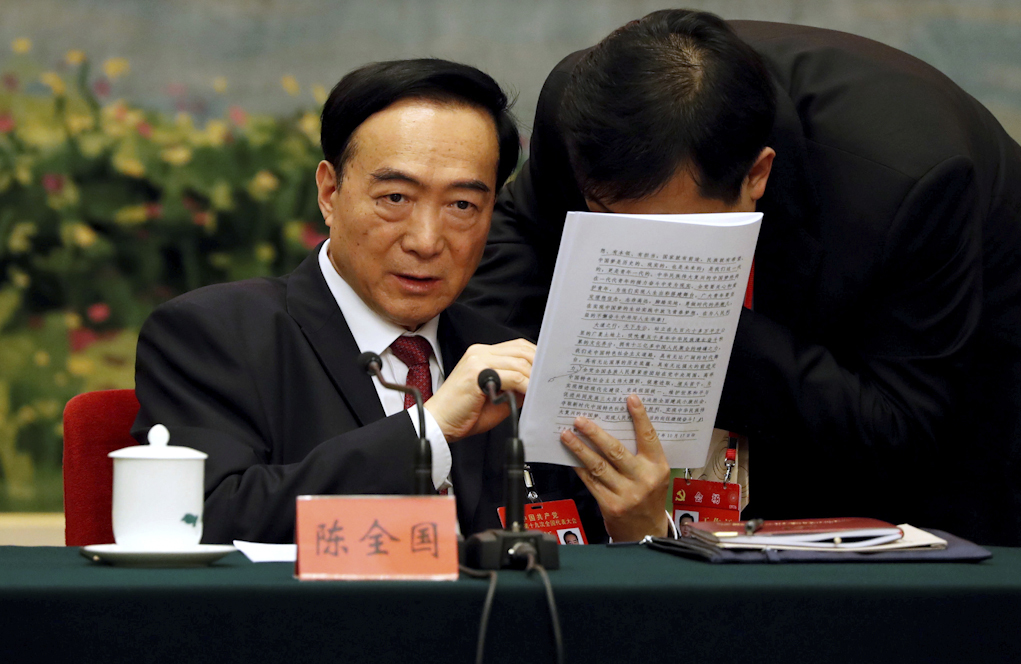- Asia: 403 pages leaked from Beijing that reveal Chinese repression against Muslims
From the capital of the kingdom of Xi Jinping they say that his hard arm has him in a former military man who now goes with a suit and tie, whose name already imposes many as soon as he says it. "A respected and hard-working guy who has helped make China one of the safest countries today," says a Beijing official.
If one asks within the Communist Party who Chen Quanguo is, they will answer that he is "a patriot," a key man in those regions where "we have rebel children who want to destroy us." If one asks outside the warm embrace of Chinese propaganda, they will speak of Chen Quanguo as an oppressive politician, capable of implanting that "patriotic conscience by force."
Tell the Uighur Muslim minority in Xinjiang, a region in the northwest of the country, famous outside the Chinese borders for the so-called "detention and indoctrination" centers built by the Beijing Government to "re-educate" the Uyghurs. Quanguo (62 years old) has been the secretary of the Communist Party in Xinjiang since 2016. Before, he had been in Tibet, where he earned the reputation as a relentless leader specializing in digital surveillance.
A month ago, the 'New York Times' published 403 pages leaked from within the Communist Party. These documents reveal that Xinjiang accounts for 21% of the arrests throughout China, that millions of Muslims had been taken to the "reeducation camps" under the premise of fighting extremism by order of President Xi Jinping.
And that these internment camps expanded in 2016 after the arrival of Chen Quanguo, who established several guides on how to act: from sending the brightest young Uighurs to universities in China - with the aim of training a new generation of Uyghur officials and teachers loyal to the party, explaining to young Muslims that their detained relatives had been "infected by the virus of Islamic radicalism and that they should be quarantined and cured." All under the pretext of fighting the terrorist insurgency that has been committing attacks in this border region with Pakistan and Afghanistan.
Weeks after these leaks, while an investigation by an international media consortium continued detailing the indiscriminate repression against the Uyghurs, Quanguo met with his cabinet to develop an information campaign, with the approval of Beijing, to combat these "false information" . Although the rhetoric was changing and, as the days went by, they no longer denied the existence of these camps, despite the fact that since the Xinjiang Government they were defined as "free internships where detainees went through a de-radicalization program."
International pressure was increasing. Especially from Washington. Earlier this month, 400 US lawmakers passed a bill that punishes Chinese officials and businesses involved in what they consider human rights abuses in Xinjiang. Above all, it seeks to impose sanctions on the maximum responsible for the alleged violations, Chen Quanguo, who was also pointed out from the European Union by the United Nations as the "architect" of the internment camps to "erase the identity of the Uyghurs through a systematic indoctrination. "
The world began to put a face and name to Quanguo, until then an unknown figure outside of China. What few know is that this politician comes from a working-class family in the agricultural and mining province of Henan. That he went to college, but who previously served four years in the army in an artillery division. And that he worked in a car factory.
When he graduated he got into politics and at the age of 33 he was already the youngest Communist Party leader in Henan's history, where he became vice governor and later promoted to governor in the northern province of Hebei. Until in 2011 he was assigned party secretary in Tibet, where he arrived with 2,500 police officers to implant that hard hand that has made him famous today.
Punishment of officials
Those who have worked for him have said in a statement to the South China Morning Post that he is a "tough and demanding boss, known for coming to the office on vacation." Everyone also agrees that Quanguo is a man very close to Xi Jinping because he represents what the Chinese president said in a speech five years ago: "The Party needs leaders who have left the bases and have the guts to make difficult decisions" .
That is why Quanguo ended up in Xinjiang. To start, as explained by documents leaked from Beijing, a "crushing and destructive offensive." That told the officials and police in the region. But there were some who rebelled against that repression, such as an official named Wang Yongzhi, who released more than 7,000 Uyghurs detained. That did not like Quanguo. "The Party will not tolerate any doubt to carry out mass arrests , " he said in 2017. Wang was arrested. And nothing more has been known about him.
The documents also reveal that during these years there have been thousands of other officials who have been punished for resisting and not carrying out the repression entrusted. They refused to participate in scenes such as those captured by a drone four months ago in Xinjiang: hundreds of Uighur prisoners in a row, blindfolded and handcuffed, being taken by police to trains that would take them, supposedly, to the fields of internment Everyone wore blue and yellow uniforms. And they had a shaved head.
According to the criteria of The Trust Project
Know more- China
- European Union
- Pakistan
- Un
- Afghanistan
- The portrait
- Asia
History Peter Frankopan: "The UN is an old club for the rich"
UEL The daughter of Uighur activist Ilham Tohti appeals to international involvement in collecting the Sakharov Prize
Wide Angle Angela Merkel's sunset plunges Germany and Europe into uncertainty

